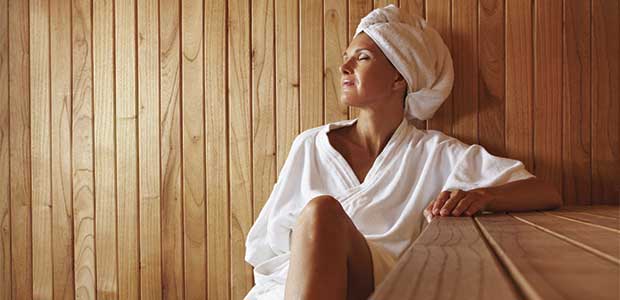Advertisement
Sweat the Small Stuff
Sauna therapy for spring cleansing

Sauna therapy is excellent for detoxification. While many assume internal cleansing is done through the gastrointestinal tract with elimination diets and clarifying herbs, sweating is another avenue of purification, making sauna therapy a great addition to your detoxification program.
Sauna benefits
Detoxification
This sweat-inducing therapy helps to rid the body’s tissues of heavy metals and environmental chemicals. Studies have shown that sauna treatments relieve symptoms in patients suffering from toxicity conditions and environmentally induced illnesses.
Weight management
Sauna therapy also supports the removal of fat-soluble toxins from the body and uses thermal stress to raise metabolic rates and oxygen consumption. This is why regular sauna treatments may help to reduce obesity.
Heart health
Beyond sweating toxins away, this cleansing practice helps to rejuvenate the body through increased circulation. Through total-body heating, sauna sessions increase heart rate and cardiac output.
This discovery has led sauna treatments to be used as a replacement for exercise for those too physically impaired to do aerobic exercise. Saunas can also decrease blood pressure and aid heart conditions over time.
Pain and discomfort
Sauna therapy reduces stiffness and muscular tiredness, as well as alleviating arthritis pain. One study cited dramatic improvements in symptoms of arthritis after only eight far infrared sauna sessions in a four-week period.
Mental wellness
Although sauna therapy has great physiological benefits, the psychological benefits are equally important, helping to combat conditions such as chronic fatigue, stress and depression. A 2005 study found that in patients with chronic heart failure, those who were in the sauna group had improved scores in somatic complaints, hunger and relaxation.
Types of saunas
In a broad sense, saunas are heated chambers made for sitting, sweating and relaxing. But not all saunas are the same. There are two types of saunas: traditional and infrared.
Traditional saunas
Traditional saunas, such as Finnish sauna baths, warm up their chambers through heated wood stoves or hot rocks. This is often dry heat, but in some cases water can be poured over rocks or other heat sources to create steam, which may help lubricate the skin, respiratory system and muscles.
Traditional saunas heat up using convection, making the air inside feel quite hot and creating an environment that some consider smothering.
Infrared saunas
Infrared saunas use incandescent infrared heat lamps to produce heat. This type of heat is said to penetrate bodily tissue more deeply and easily without feeling as hot as traditional saunas. Users of infrared saunas, particularly far infrared saunas, sweat more vigorously at a lower temperature.
Sauna safety and strategies
Sauna preparation
Sauna therapy can be stress relieving as well as detoxifying, but in order to benefit from it and enjoy your experience, you must prep for sessions properly. Before going into a sauna, it is important not to eat too much. Eating before sweat bathing is said to strain the circulatory system and can cause a steep drop in blood pressure.
However, it is also important not to be too hungry or exhausted, as the sauna’s heat is thought to burn energy and kilojoules.
Start with a warm shower. While in the shower, brush or exfoliate your skin to unblock pores, thereby enabling maximum sweating and detoxification. After, remove all metal jewellery, which could heat up and burn your skin. Ideally, enter the sauna nude so that you avoid overheating and do not reabsorb toxic sweat that can be held in clothing. Now you are ready!
In-sauna practices
The most important thing to do while in the sauna is relax, breathe and allow your muscles to release tension. Everyone has different means of doing this. Some find that reading helps with this, while others find socialising the easiest way to unwind. Whatever your de-stress style, it’s important to get comfortable.
Stay hydrated; drink plenty of water to replenish the moisture you lose by sweating to avoid dizziness and fatigue.
If you are particularly ambitious, you can gently exercise. While you should avoid high-impact cardiovascular exercises, it is generally safe to engage in strengthening activities such as squats, push-ups and sit-ups. The heat helps to burn extra kilojoules and increases the intensity of the exercise.
Yoga may also be practised in the sauna; however, before attempting any in-sauna activity, be sure to discuss it with your health care practitioner to ensure you are fit to do so. If you are given the go-ahead, always be conscious not to over-exert yourself so you do not become exhausted, light-headed or nauseous.
Those who are new to sauna therapy should stay in a sauna for a maximum of 20 minutes, but this duration can increase to 40 minutes after using a sauna successfully a few times. Always shower after sauna therapy to wash away sweat and impurities.
Contraindications and risks
Sauna bathing has few reported adverse effects, but there are still precautions users must be aware of. While studies have shown that infrared sauna therapy does not have adverse effects on pregnancy or lactation, it is still wise to avoid it during pregnancy, as hyperthermia is said to increase the risk of birth defects.
It is also important to refrain from alcohol consumption before and during sauna usage. Alcohol can dehydrate you as well as impair judgment, affecting your ability to monitor your bodily sensations and sauna duration.
It is always important to maintain awareness while in the sauna. If you experience nausea or dizziness, exit the sauna immediately. Safe sauna practices are important so that you can truly gain from this wonderful, health-supporting therapy and enjoy it as a restorative, renewing experience.





